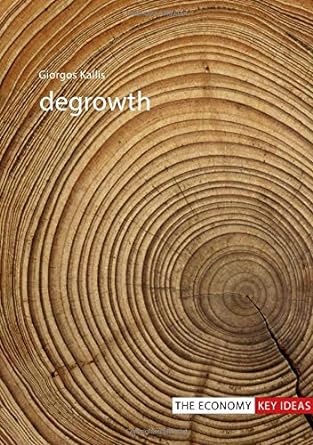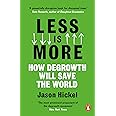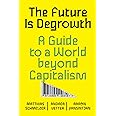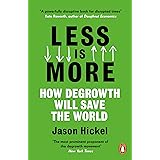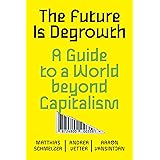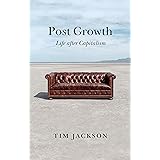Buy new:
$34.25$34.25
Save with Used - Good
$29.99$29.99
Ships from: Amazon Sold by: Amplified Acoustics LLC





Download the free Kindle app and start reading Kindle books instantly on your smartphone, tablet, or computer - no Kindle device required.
Read instantly on your browser with Kindle for Web.
Using your mobile phone camera - scan the code below and download the Kindle app.

Follow the authors
OK
Degrowth (The Economy: Key Ideas) Paperback – June 30, 2018
Purchase options and add-ons
Giorgos Kallis provides a clear and succinct guide to the central ideas of degrowth theory and explores what it would take for an economy to transition to a position that enables it to prosper without growth. The book examines how mainstream conceptualizations of the economy are challenged by degrowth theory and how degrowth draws on a multifaceted network of ideas across disciplines to shed new light on the economic process. The central claims of the degrowth literature are discussed alongside some key criticisms of them. Whether one agrees or disagrees with degrowth’s critique of economic growth, Kallis shows how it raises fundamental questions about the workings of capitalism that we can no longer afford to ignore.
- Print length240 pages
- LanguageEnglish
- PublisherAgenda Publishing
- Publication dateJune 30, 2018
- Dimensions5.75 x 0.75 x 8.25 inches
- ISBN-101911116800
- ISBN-13978-1911116806
The Amazon Book Review
Book recommendations, author interviews, editors' picks, and more. Read it now.
Frequently bought together

Similar items that may deliver to you quickly
Editorial Reviews
Review
“Kallis’s personality resonates through the pages ... clear, approachable and often humorous ... he succeeds in making Degrowth accessible to a wide audience ... the pace is well suited to those new to the subject, including students. Kallis skillfully unpacks complex concepts and provides a consistent stream of accessible analogies.” -- Maxwell Hartt, Economic Geography
Mandatory reading for students, researchers and practitioners interested not only in degrowth, but also more generally in economics, politics and sustainability. The book's arguments are highly significant to tackle the key challenges of the twenty-first century – climate change, rising global inequality, economic crises ... well written: scholarly yet accessible, rigorously argued but with humor and full of everyday examples ... A welcome addition to degrowth scholarship and will have considerable influence on teaching degrowth at both undergraduate and graduate levels. -- Matthias Schmelzer, Ecological Economics
A thought-provoking, informative and comprehensive resource ... offers both a justification as well as a vision and new imaginary for degrowth ... Kallis’ hypotheses and theories are well- researched, and linked to empirical data. -- Sarah Hafner, Centre for the Understanding of Sustainable Prosperity (CUSP) blog
About the Author
Excerpt. © Reprinted by permission. All rights reserved.
Degrowth
By Giorgos KallisAgenda Publishing
Copyright © 2018 Giorgos KallisAll rights reserved.
ISBN: 978-1-911116-80-6
Contents
Preface, vii,1 What is degrowth?, 1,
2 The economics of degrowth, 15,
3 Economic growth from a degrowth perspective, 61,
4 The case for degrowth, 85,
5 The utopia of degrowth, 117,
6 Controversies, debates and future research, 149,
References, 191,
Index, 213,
CHAPTER 1
What is degrowth?
A ruthless critique
"I am not proposing a return to the Stone Age. My intent is not reactionary, nor even conservative, but simply subversive. It seems that the utopian imagination is trapped, like capitalism and industrialism and the human population, in a one-way future consisting only of growth. All I'm trying to do is figure out how to put a pig on the tracks."
— Ursula Le Guin
Degrowth is a ruthless critique of the dogma of economic growth – a new keyword: a "pig on the tracks" of "a one-way future consisting only of growth" (Le Guin 1982).
Degrowth is, first, a critique of the ecological consequences of economic growth. The faster we produce and consume goods, the more we transform and damage the environment. There is no way to both have your cake and eat it, here. If humanity is not to destroy the planet's life support systems, the global economy should slow down. We should extract, produce and consume less, and we should do it all differently. Growth economies collapse without growth. To prosper without growth we have to establish a radically different economic system and way of living.
Second, economic growth is no longer desirable. The costs of growth exceed its benefits. Growth is no longer "economic". Growth is a recent phenomenon of industrial capitalism. Economists first measured it in the 1930s, and its pursuit became universal only from the 1950s. Civilizations before industrialization flourished without growth and without caring about growth.
Third, growth has always been based on exploitation. Without a surplus, there is no investment and no growth. To have a surplus, capitalists or governments must exploit someone, somewhere. If they paid this someone the real value of her work, then they would not have a surplus and there would be no growth. First there were the slaves, and the natives of the colonies. Then there were the commoners, and the workers in the factories; and there were always the women at home. Growth cannot reduce inequalities; it merely postpones confronting exploitation.
These opening statements are bold. I ask patience from the reader who disagrees. The remainder of the book explains the theory and the facts that support these claims. But let us first look at where these contrarian ideas came from, and what their relationships to economics are.
A tree with deep roots
"Degrowth" sparked after the millennium, first in France and then elsewhere. The ideas that nourished it – from early environmentalism, to the bioeconomy of Georgescu-Roegen, the voluntary simplicity movement and the cultural critique of development and modernity – date further back. Degrowth is not the natural, or only, culmination of these streams. No one can ever know what some of the thinkers who have inspired degrowth would think of it. But starting from the tree that degrowth is today, and looking at its roots, we find the following ideas.
The first, and perhaps deepest, root is the radical Western environmentalism of the 1960s and 1970s, which was fuelled by the work of two women: Rachel Carson and Donella Meadows. Carson, in her 1962 Silent Spring, documented how pesticides destroyed environments and poisoned people (Carson 1962). With her partner and colleagues at MIT, Meadows wrote The Limits to Growth, which was presented to the Club of Rome and showed how exponential growth – that is, growth at a constant compound rate – is bound to end with collapse because it will eventually exhaust the raw materials that fuel it and pollute the environments that it depends upon (Meadows et al. 1972). Carson and Meadows used science and facts to express a commonsensical truth that dated back at least to nineteenth-century Romantics: the growth of industry and the integrity of the natural world do not go together.
In the 1960s and 1970s, criticism of growth went beyond environmental questions. Amidst the wealth generated by the postwar boom, there was still poverty, wars and the ever-present threat of a nuclear holocaust. Herbert Marcuse, a German–American philosopher, described how industrial capitalism created false needs, producing "one-dimensional" humans (Marcuse 1964). The Harvard economist and president of the American Economic Association John Kenneth Galbraith wrote about the paradox of the "affluent society": how the creation of false needs by advertising raised the demand for private goods and increased gross domestic product (GDP) while depriving authorities of vital resources for the provision of public goods (Galbraith 1958). Writing later, in 1976, in the midst of an economic crisis, Fred Hirsch (a Viennese emigre to Britain who was a professor at Warwick and formerly the financial editor of The Economist wrote about "the social limits to growth". Growth, he argued, can never make everyone middle class. The value of "positional goods" – an expensive car, the latest gadget or an expensive jewel – is what they signal about your position in society. If everyone had the good and the position, then the good would have no value. Growth cannot generalize access to goods if their essence is that only a few can have them – it can only inflate their prices and intensify frustration (Hirsch 1976).
Ecological economics – a new discipline that brought together ecologists, economists and social scientists dissatisfied with the way mainstream economists treated environmental issues – focused on the conflict between growth and the environment. The field's first international conference was held in Barcelona in 1987 and was organized by Catalan economist–historian Joan Martinez-Alier. Two years later, the International Society for Ecological Economics was founded. Nicholas Georgescu-Roegen (a Romanian mathematician–economist who emigrated to the United States) argued in his 1971 masterpiece Entropy and the Economic Process, a thermodynamic rethinking of economics, that the economic process transforms – inevitably and irreversibly – low-entropy (high-order) resources into high-entropy (low-order) ones (Georgescu-Roegen 1971). Given that mineral stocks and fossil fuels are exhaustible, human activity will in the long run have to "decrease" to a scale that is supportable by the rate of flow of solar energy (Georgescu-Roegen 1975). Georgescu-Roegen supported the models of The Limits to Growth with physics and economics. His disciple Herman Daly in turn argued that in the long term, only a stationary (steady) state of economic activity is sustainable (Daly 1991). The economy, he claimed, must have a constant "throughput" of energy and materials.
Ecological economists after Daly and Georgescu-Roegen criticized growth but did not go as far as advocating "degrowth" (not until more recently). The term "degrowth" was coined in French. In a 1972 debate between Andre Gorz, Herbert Marcuse and Sicco Mansholt (then president of the European Commission) published by Nouvelle Observateur, Gorz, who had read The Limits to Growth, wondered whether capitalism was compatible with a "decroissance" (degrowth) in material production, which was necessary to restore earth's balance. In 1977, reading Georgescu-Roegen, Gorz argued that perpetual growth was physically impossible, and that ecological realism demands that we consume less (Gorz 1977).
Gorz was part of what was called the movement for "political ecology" in Europe at the time. Petra Kelly and the German Greens were criticizing industrialism and the pursuit of growth in the affluent West. For them, the issue was not only that there are limits to growth, but that people should organize politically to end a capitalist system that is geared to either grow or die. Gorz, Kelly and the Greens, however, were equally critical of existing socialist economies, calling them "the continuation of capitalism by other means", advocating instead for "well-being through degrowth" with "a subversion of the prevailing way of life" (Gorz 1977).
When, in 1979, Jacques Grinevald and Ivo Rens, professors in Geneva, published a French translation of a collection of Georgescu-Roegen's essays, they titled it Tomorrow Degrowth ("Demain la Decroissance") after Georgescu-Roegen's "decrease", who consented to the title. "Decroissance" assumed a new meaning in the French lexicon, becoming a slogan for radical ecologists. In the late 1990s and early 2000s activists like Bertille Darragon, Sophie Divry, Bruno Clementin and Vincent Cheynet in Lyon published a widely read weekly, Décroissance, and carried out direct action against advertising and in favour of a car-free city. Right from its birth in France, the degrowth community has been an amalgam of research and action – a mixture of researchers, professors, activists and downshifters, who lived as they professed.
No academic did more to popularize degrowth than Serge Latouche, a French economist and anthropologist at Université Paris-Sud. In his fieldwork Latouche showed how development programmes Westernized Africa and South-East Asia (Latouche 1996). Together with Wolfgang Sachs and Maria Mies (both German), Arturo Escobar (Colombian), Vandana Shiva (Indian) and many others, Latouche was part of a "post-development" school of thought that criticized Western ideas of development documenting how these destroyed indigenous modes of living. International development was colonialism with a different face, they argued (Sachs et al. 1997).
Unlike ecological economists, Latouche drew from the work of Karl Polanyi to develop a critique of "economism": the expansion under capitalism of the logic of commodity and market exchange to realms of life from which they were previously omitted. What is understood today as the "market economy", Latouche (2012a) argued, is a modern – politically and socially constructed – invention.
Latouche talked of "autonomy", a term used by Greek philosopher Cornelius Castoriadis. Castoriadis fled to Paris in 1945 on board the boat Mataroa, which rescued intellectuals who were persecuted during the Greek civil war. He worked as an economist at the Organisation for Economic Co-operation and Development (OECD) until 1970 but he wrote under pseudonyms ("Pierre Chaulieu" and many others) for the revolutionary "Socialism or Barbarism" group, which he helped to found. He studied psychoanalysis and philosophy, combining them with a deep understanding of Marxism and economics. "Autonomy" meant an awareness by people that it is they themselves that make their own laws ("nomos") and history, freed from the delusion that these are given by an external authority, be that God and the Church or, after them, markets, the economy and their experts. For Castoriadis the future is essentially indeterminable: there are no laws of history, since human beings can always come up with new, unpredictable ways of seeing and changing the world. Castoriadis criticized growth-based development as a new source of "heteronomy": a new religion of a sort – a universal imperative the pursuit of which all societies must devote themselves (Castoriadis 1997).
Castoriadis's ideas developed in dialogue with those of Hannah Arendt, one of the most remarkable philosophers of the postwar era, who also dealt with autonomy but in relation to work. In The Human Condition, Arendt distinguished between work, labour and "action", the latter referring to political and contemplative activity beyond the realm of necessity or utility (Arendt 1959) – what Gorz (1982, 1994) would classify as the domain of autonomy.
Ivan Illich was another great theoretician of autonomy and "conviviality". A radical catholic priest and academic born in Vienna, Illich lived and worked in Cuernavaca in Mexico. For Illich, autonomy requires simple ("convivial") technologies and decentralized, community-led energy, education or health infrastructures. Illich criticized the "radical monopoly" of some technologies, such as the car, whose physical and social infrastructure leaves people with few options but to use it if they want to participate in social life. Only small-scale systems can be governed directly by people without the mediation of experts, Illich argued. Large systems divide society into experts and laypeople. Experts accumulate power at the expense of people. Illich's slogan was that socialism can then only arrive by bicycle. A complex technological system cannot be democratic or egalitarian (Illich 1973, 1974).
Latouche brought together the ecological economics of Georgescu-Roegen, the political ecology of Gorz and Illich, the philosophies of Castoriadis and Arendt and the concerns of post-development (Latouche 2009). He integrated the ecological, economic and sociological critique of limits to growth with the postcolonial critique of development and the Polanyian thesis against the expansion of market relations. Latouche called for an "exit" from the economy in the name of autonomy and democracy. With "degrowth", he married a critique of development programmes in Africa to a critique of so-called sustainable development in Europe.
In 2008 "Research & Degrowth", a collective founded by Francois Schneider, Fabrice Flippo and Denis Bayon, organized the first international conference on degrowth in Paris. Schneider, a doctor of industrial ecology, became the public face of degrowth in France after a long march with a donkey, discussing degrowth with bewildered passers-by. The conference marked the birth of an international community of researcher–activists. The International Society for Ecological Economics supported it, with a strong contingent from ICTA in Barcelona, the group of Joan Martinez-Alier. Serge Latouche and the Francophone school on degrowth met again with ecological economics, discovering their shared origins in the work of Georgescu-Roegen. The conference and the publications that followed it brought "degrowth" to English-speaking academia (Schneider et al. 2010). The 1970s "limits to growth" debate and radical 1980s green ideas were back with a vengeance. In somewhat separate, but related, developments in the UK, Tim Jackson's (a participant in the Paris conference) Prosperity Without Growth became a best-seller. The book claimed that it was impossible to both avoid climate change and grow the economy (Jackson 2008). In the United States, an intellectual movement for a "new economy" emerged around the work of economist–sociologist Juliet Schor on overworking and the wealth of a sharing economy (Schor 2010).
The international degrowth community grew, holding conferences every two years, with 4,000 people attending the 2012 meeting in Leipzig. New scholars joined, new debates opened and the accumulated knowledge of larger movements fertilized degrowth debates. Feminist economists like monetary theorist Mary Mellor (see Mellor 2010) and Antonella Picchio brought attention to care work, social reproduction and the gendered division of labour (see also Perez-Orozco 2016). Anthropologists like Susan Paulson and Lisa Gezon looked at rooted ethnographies of Western and non-Western peoples living without growth (Paulson 2017). Historians deconstructed the origins and hidden ideology of growth (Borowy & Schmelzer 2017). And environmental justice activists, from both the Global North and the Global South, brought their experience from direct action against extractive or infrastructure projects pursued in the name of growth (Martinez-Alier 2012). Academics articulated a critical perspective embodied by social movements, most notably in environmental justice struggles, reconstructing the term "degrowth" analytically. But the flow of ideas was multidirectional. It was activists, who learn from each other and read the work of academics, who came up with the term "degrowth", only for the term to travel back to academia (Martinez-Alier et al. 2014).
Degrowth is a burgeoning research agenda. The ambition is not only to understand the world, but to change it. So what is the role of economics in all this?
Degrowth and economics
Economic growth is a concept developed by economists. From the beginning the discipline set its mission to be the study of the origins of wealth. Economists advise governments on how best to pursue growth. The term "degrowth" would consequently naturally make one think that it pertains to the realm of economics. This, though, would be partly wrong.
Degrowth evolved as much as a critique of economic reasoning as a critique, within economics, of the limits and costs of growth. The first line, prominent in the work of Latouche, criticizes how economists frame reality. The problem is not only that the economy cannot or should not grow. Our very ideas of what an economy is are wrong. "Exiting the economy" means exiting existing economics, mobilizing different forms of knowledge, models and representations of reality to engage with the phenomena economists classify as "economic". The objective is to decentre the economy as a unit of analysis and as a focus of political action.
Heterodox – ecological and political – economists like Daly, Victor, Jackson or Mellor instead develop a critique within the field of economics. They accept some aspects of neoclassical or Keynesian models and reject others. Unlike those who develop non-economic theory about the economy, they work with economic theories, models or data to investigate conditions under which economic stability could be maintained without growth. Or they propose labour, taxation or monetary policies that can reduce material and energy flows while stabilizing a contracting economy. They aspire to a "new" economics – but an economics nonetheless.
(Continues...)Excerpted from Degrowth by Giorgos Kallis. Copyright © 2018 Giorgos Kallis. Excerpted by permission of Agenda Publishing.
All rights reserved. No part of this excerpt may be reproduced or reprinted without permission in writing from the publisher.
Excerpts are provided by Dial-A-Book Inc. solely for the personal use of visitors to this web site.
Product details
- Publisher : Agenda Publishing (June 30, 2018)
- Language : English
- Paperback : 240 pages
- ISBN-10 : 1911116800
- ISBN-13 : 978-1911116806
- Item Weight : 11.2 ounces
- Dimensions : 5.75 x 0.75 x 8.25 inches
- Best Sellers Rank: #1,830,108 in Books (See Top 100 in Books)
- #1,201 in Development & Growth Economics (Books)
- #2,949 in Environmental Economics (Books)
- Customer Reviews:
About the authors

Discover more of the author’s books, see similar authors, read author blogs and more

Giorgos Kallis was born and raised in Athens, Greece. He has lived and studied in London, Luxemburg, Amsterdam, and Berkeley. Now he is an ICREA Professor at ICTA at the Autonomous University of Barcelona where he coordinates the Marie Curie-funded European Network of Political Ecology (ENTITLE). He teaches political ecology and ecological economics. His fixation is with what Serge Latouche calls the “degrowth project,” that is the hypothesis that we can build a society which can prosper without growth. When he doesn't waste time fighting on twitter with those who defend economic growth, he plays and watches football, jogs by the bay of Barcelona, tries to compose tunes on his piano or spends his summertime in Syros. He is not as boring as it sounds..
Personal website: www.icrea.cat/Web/ScientificStaff/Georgios-Kallis--481
Customer reviews
Customer Reviews, including Product Star Ratings help customers to learn more about the product and decide whether it is the right product for them.
To calculate the overall star rating and percentage breakdown by star, we don’t use a simple average. Instead, our system considers things like how recent a review is and if the reviewer bought the item on Amazon. It also analyzed reviews to verify trustworthiness.
Learn more how customers reviews work on Amazon-
Top reviews
Top reviews from the United States
There was a problem filtering reviews right now. Please try again later.
This 2018 book by Georgos Kallis certainly seems to be a good overview and introduction. It is an academic book, with 21 pages of references and full of arguments with competing ideas. Kallis is embedded in ecological economics, the sub-field that Daly was key in creating. Degrowth is interdisciplinary, though, and the key thinker is Serge Latouche, an economist and anthropologist, who brought ecological economics together with political ecology, philosophy, and post-development theory. He defines degrowth as "a process of building an autonomous, convivial society" (10).
This book should become part of the higher education curriculum, and environmental activists need to know about the idea of degrowth. It is a critical rejoinder to any notion of "sustainable growth" or "sustainable capitalism."
(verified purchase from the Cosmic Book Emporium)
Among the book's virtues is that the author (GK) writes in a clear, mostly jargon-free style, even when some of the ideas he discusses are abstract. This is harder to achieve than it sounds. Another strength is that he devotes a lot of space to political aspects of degrowth, in contrast to most other writers who see the topic as primarily, or even almost exclusively, economic. The political theme is especially prominent in Chapter 5, "The Utopia of Degrowth," which discusses specific policies and political pragmatics to a greater extent than I can recall seeing anywhere else in the English-language degrowth literature. The book also emphasizes the distinction between exchange value and use value in economics, with an emphasis on the relevance of the latter concept -- effectively absent from mainstream economic theory -- to degrowth.
One factor that might limit the book's readership is its orientation towards theory. In this it retains the spirit of the important 2015 volume GK co-edited, Degrowth: A Vocabulary for a New Era . Topics like the labor theory of value (see below) are discussed at length, even though this it isn't necessarily dispositive for policy. GK also follows the earlier volume in advocating "dépense," the practice of spending money on useless things for the community, such as feasts. As I noted in my review of the earlier book, from a practical political point of view I can't imagine many voters warming up to the idea of deliberately wasting public money -- it seems more an idea for scholars to enjoy. Nonetheless GK does give a clearer and more concrete explanation of the topic than in the "Vocabulary," so if you're intrigued by the idea, this book offers a good exposition.
A more significant limitation might be that the book seems to assume its readership comes from a political and intellectual space on the left. If you like the writings of David Harvey, and if you tend to favor publishers like Verso, Pluto and Polity for your non-fiction reading, you could very likely find this book quite appealing. On the other hand, if you're scandalized by an author who takes Marxian ideas seriously, this book isn't for you.
For example, the discussion of exchange value and use value is expressed in terms of lengthy discussions of the "labor theory of value," a concept introduced by Adam Smith but that plays a much more prominent role in Marxist thought. There are less provocative ways of presenting the topic of use value, such as via a discussion of Aristotle's distinction between types of exchange: exchanges whose goal is to accumulate money, and exchanges whose goal is to acquire things the purchaser will use. (For Aristotle and the roots of use value generally, see Scott Meikle, Aristotle's Economic Thought (Oxford UP 1995); for more in English on Aristotle and degrowth, see my working paper "Unlimited Growth: Paradise or Paradox?" (2010), posted on the Social Science Research Network.) The Marxian framing of the issue may be fine for some readers but a turn-off for others. I'm an advocate of degrowth, and agree with GK on many points. But if I think of the main groups I'm most interested in persuading about the benefits of degrowth -- undergraduate business students, local businesspeople, and voters in a conservative country like Japan, where I live -- I'm quite sure that Aristotle would be a safer bet.
This is a pity, because there's a need for an up-to-date book like this -- especially with its attention to politics -- that could introduce degrowth to agnostics and skeptics across the political spectrum.
The rest of this long review focuses in some detail on two areas that I hope will be revisited in the next edition of the book: finance, and the discussion of the connections between certain physics concepts and economics.
A. FINANCE: Currently, the book speaks of finance mainly in the context of debt bearing compound interest. That kind of interest grows exponentially with the passage of time, and much more quickly than simple interest. The argument is that in order to pay off this endlessly-growing interest, you need to produce and sell an ever-growing amount of goods and services: economic growth.
The weakness of the argument is that modern finance isn't so anchored to the real, material economy of goods and services -- the economy measured by GDP. Since sometime before start of the 21st Century, financial markets became **many times bigger** than global GDP. How is that possible? Because although brokerage fees and income from financial services are included in GDP, the value of sales of financial instruments on financial markets is not. Just considering equity (stock) markets alone, the annual global sales volume is bigger than global GDP. Then add in bond markets, commodities markets, derivatives markets (the one that caused the 2008 crash) and foreign exchange markets (the biggest), and you have a much bigger playground than the real economy of goods and services. Moreover, profits on these markets (known as "capital gains") are much less evenly shared than the salaries and other paychecks that get rolled into GDP: in the US, roughly 49% of all capital gains go to the richest 0.1% of the population. In other words, if you're a rich person, what happens on these markets is much more important than what happens in the real economy.
This book doesn't mention anything about the disconnect between these markets and GDP. Instead, it only asserts that financial gains from "speculation" are "simply a redistribution of value produced elsewhere in the economy;" while this "may give the impression of growth decoupled from resource constraints," that impression is "an illusion" (@178). No further explanation is given. The use of the word "growth" in this statement is something of a distraction, since in our current political economy that term refers to growth in GDP -- and GDP, as explained above, isn't directly pertinent to modern financial markets. More importantly, this summary dismissal of financial gains as "illusion" isn't sufficient to explain the reality of modern finance. The financial gains from speculation are bigger than global GDP altogether -- so they can't simply be a redistribution of value from the real economy.
But, you might object: doesn't all that money come back into the real economy through purchases of yachts, vacations on private islands, thousand-dollar-per-week cigar expense, etc.? No. Rich people don't spend everything they own. A lot of the money is tied up in illiquid assets. Moreover, price increases don't have to be funded by increased production. Suppose you paid cash to buy a house in Palo Alto, CA, in 2015 at the then-median price -- ca. $2.5 million --, and you want to sell it in January 2019, preferably to a buyer who pays cash, again at the median price -- roughly $3.2 million. (Yes, there are people who pay cash for such houses.) Does your buyer's extra $700K have to come from economic growth? Not at all - it could come from, among other possibilities, selling equities in the bull market that lasted most of the way through 2018, or in the early 2019 rally. (If you believe in the fairy-tale that stock prices are related to fundamentals in the real economy, then suppose the profits came from shorting stock in the late 2018 downturn, or from forex trading, or from derivatives, etc.) That is, the source of increased speculative value in one market (housing) can be increased speculative value in another (the stock market). And both the buyer's profits on the stock market and your $700K profit on the house sale are capital gains, not included in GDP.
Beyond this, the rich have another use for money -- power. As John Kenneth Galbraith was fond of pointing out, power is something economics tries to pretend doesn't exist. (E.g., The Economics of Innocent Fraud (2004).) Why else do billionaires fret about their ranking on the Forbes list? Does someone with, say, $20 billion in wealth really spend much more than someone with only $10 billion? But merely by having $20 billion in wealth, they are probably able to command much more attention than someone with only half as much.
So the materialist account of finance in books like the present seems not to address adequately the realities of finance and the power of money. Its mechanistic explanation of the need for growth is too simple. There are many other reasons that can explain why our current approach to economics favors infinite growth. For one, political pressures dating back to the Cold War period, when growth became the imperative for national policy and a declining growth rate risked getting you kicked out of office. For another, the simple psychological insight of Aristotle, that when you focus your desire on wealth measured by something as arbitrary as a number, there isn't any inherent limit. To be fair to GK, though, I have yet to see any English-language book about degrowth that adequately explains the role of the financial economy. I hope that a 2nd edition will reconsider finance from a broader perspective.
B. ENTROPY, ETC. A number of the arguments and claims in Chapter 2, apropos of the roles of energy and entropy in the economy, need repair. For example, GK defines the physical concept of work as "intentional energy expenditure that alters the object to which it is directed" (@28). Unfortunately, that's not quite right. The convective cells in in your morning coffee, a river that pushes pebbles and silt along its flow, a hurricane that blows a roof off a house or a reporter off his feet: in each of these systems, a force is doing work without involving any intention. The text also falls into the very common error of comparing entropy to physical order, here compounded by the claim (@26) that energy must be input in order to turn liquids, such as water (disorder) into solids, such as ice (order). Actually, most crystallization processes -- the freezing of water, the solidification of metals, etc. -- are exothermic: far from needing energy inputs, they release energy. (Of course the temperature at which you attempt these operations does matter: e.g., on a winter day in my northern Japan hometown I can just put some water outdoors to make ice, but if I were in Barcelona I'd usually need a refrigerator to do so. This is in line with the laws of thermodynamics, too: without a fridge, the heat in the Barcelona air will deliver energy to the ice cube, breaking the intermolecular bonds and melting it: opposite to what this book says. )
Some of GK's arguments are based on those of one of the patron saints of degrowth, the economist Nicholas Georgescu-Roegen (1906-1994), known to many as NGR. Inspired by the Second Law of Thermodynamics, NGR claimed that all economic processes inevitably lead to waste, in the form of heat and material. Whether NGR's arguments are true as a matter of fundamental physical laws or simply as a practical matter has been a subject of controversy -- but at least as a practical matter, they're pretty much accurate. So it's a little odd that, just like conventional economics textbooks, GK's diagram illustrating "a general scheme of the economic process" (Fig. 2.4 @59) doesn't show waste of any type at all. This should be rethought for the next edition.
NGR was also a prophet of scarcity, claiming that there is a finite stock of "low entropy energy" (including oil, coal, and other fossil fuels) with which the Earth was endowed; there is also an extractive flow when we burn this fuel, leading us to lose it as "high entropy" heat. Like most other writers on degrowth and many other ecological economists besides, GK echoes this idea of a finite stock (@27). But this narrative is incomplete: NGR and most of his followers neglect that there's also a creative or incoming flow. Quite contrary to NGR's mystical thesis about entropy, the creation of fossil fuels is thermodynamically favored -- they're being created even during the few minutes that you're reading this review. If we stopped using them now, then eventually the supply would come back to 18th Century levels. We'd just need to wait tens or hundreds of millions of years, which is well within the timeframe for the continued stability of the Sun (ca. 5 billion years). So the supply problem faced by fossil fuel-reliant economies isn't a finite stock: it's that the rate at which new fossil fuels are being created is much slower than the rate at which we're consuming them (on the order of hundreds of years).
Unfortunately, NGR's emphasis on thermodynamics has captivated his followers. Unfortunate, because reaction rates aren't explained simply by thermodynamics: you also need to consider chemical kinetics. Kinetics relies on a physics paradigm known as statistical mechanics, which by the early 20th Century could explain pretty much everything 19th Century thermodynamics could, and then some. But due to some misunderstandings about entropy and the "arrow of time," NGR thought statistical mechanics was bunk, which led his theories astray. So he ignored kinetics, as have most of his defenders and even critics. (Among critics, an early exception was A.O. Converse (1996); see also a 2010 paper by M.D. Glucina and K. Mayumi. For more about kinetics and degrowth discourse see section A.5 of my working paper "The Birth of Décroissance" (2017), on SSRN.)
Fortunately, the truth or accuracy of NGR's arguments isn't a pre-condition for degrowth's being a good idea. As a practical matter, the book's discussion of why fossil fuels are scarce over relevant time scales would be relatively simple to fix, and I hope GK will consider doing so. Some readers of this review might wonder, though, why all this matters. If your background is in economics or other social science, maybe you'll feel that the difference between thermodynamics and kinetics is academic hair-splitting. The response to that argument is two-fold: #1, from a physics point of view, it's not a trivial distinction. And #2, degrowth isn't such a popular position that its advocates can afford to be loose about their arguments. Weak science is an easy target for critics who want to dismiss the idea of degrowth out of hand.
In sum, this is a generally good book, with some room for improvement in a couple of specific areas. I'm disappointed that it wouldn't be suitable for use in my own teaching, since most of my students have been imbibing a very conventional economics education, or are even interested in pursuing an MBA. A sizable chunk of that audience, as well as voters without any formal economics training, eventually must be persuaded if degrowth is to become a practical reality. But in the meantime, there's an audience for this book, too, and I expect they will hold it in high regard.
[PS after posting: I read the paperback edition, and didn't realize Amazon would attribute this review to the Kindle edition. Page references refer to the paperback; I don't know if the Kindle edition allows true page numbering.]
Top reviews from other countries
If you are interested in the ideology of confused modern youngsters that shout "system change!" on the streets, read this book - its a good example for this confused ideology. If you are interested in gaining knowledge about subjects such as economics, political theory, social philosophy, or anything alike - this book is not for you, as Kallis has no knowledge in any of these areas and just spreads his incompetence.

